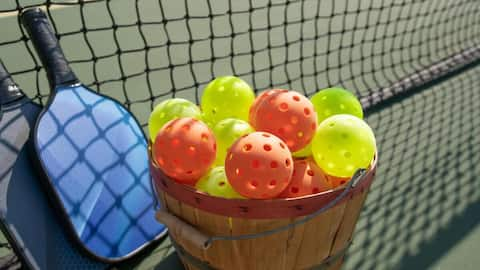Pickleball: An ageless sport for fitness of mind and body
What's the story
Pickleball is a dynamic and engaging game played with a paddle and a perforated plastic ball on a court resembling a badminton court but with a lower net. Combining elements from tennis, badminton, and table tennis, pickleball has transitioned from a simple backyard pastime to a widely enjoyed sport by players of all ages. Let's explore the rising popularity and health benefits of pickleball.
How to play
Rules and techniques of pickleball
The game begins with an underhand serve, and players must let the ball bounce once on each side before volleys are allowed. Points can only be scored by the serving side, and the game is typically played to 11 points, with a required winning margin of two points. Techniques include dinking, volleying, and executing precise shots close to the net.
Popularity
Accessibility and ease of play
One of the primary reasons for pickleball's popularity is its accessibility. The rules are simple, making it easy for beginners to learn. The equipment needed is minimal and the sport can be played indoors or outdoors, adapting to various environments and weather conditions. Moreover, the sport's slower pace makes it less intimidating and more manageable for players of all ages and skill levels.
Small court
Pickleball is a social activity
With a pickleball court being smaller than a tennis court (one tennis court can convert to four pickleball courts), players can be in close enough proximity to hold conversations during gameplay, creating an enjoyable social atmosphere alongside its competitive aspect. This makes pickleball ideal for both family bonding and socializing with friends, offering a fun workout experience for all involved.
Mental benefits
Strengthening intergenerational ties within communities
Community centers and parks can host regular pickleball meetups, fostering a sense of belonging while enhancing physical health and providing emotional support. This is especially beneficial for older adults craving social interaction and appeals to younger players seeking connections. The sport's communal atmosphere encourages consistent participation, driving its increasing popularity and strengthening intergenerational ties within communities.
Cognitive function
A holistic approach to mental well-being
Pickleball enhances mental well-being through its strategic gameplay, requiring quick thinking and split-second decision-making. Anticipating opponents' moves fosters mental agility, maintaining cognitive function and potentially delaying decline. Additionally, the physical activity releases endorphins, reducing stress, anxiety, and depression, promoting overall mental health. Thus, pickleball offers a dual benefit of mental stimulation and physical exercise, contributing to a healthier mind and body.
Physical benefits
Cardiovascular health and muscle strength
Pickleball provides a comprehensive workout that benefits both cardiovascular health and muscle strength. With its quick movements and continuous play, pickleball elevates your heart rate, enhancing heart health and overall endurance. Additionally, the sport's frequent lateral movements, quick pivots, and bursts of sprinting work to strengthen muscles in the legs, core, and arms. The swinging motions further contribute to improved arm and shoulder strength.
Maintains mobility
Enhances well-being in aging adults
Pickleball holds special benefits for older adults. The game improves balance and coordination by necessitating rapid direction changes and honing hand-eye coordination, crucial for preventing falls and maintaining mobility in aging populations. Furthermore, its low-impact nature makes it an ideal choice for those with arthritis or joint issues, as the smaller court size minimizes strain on the body compared to high-impact sports.
